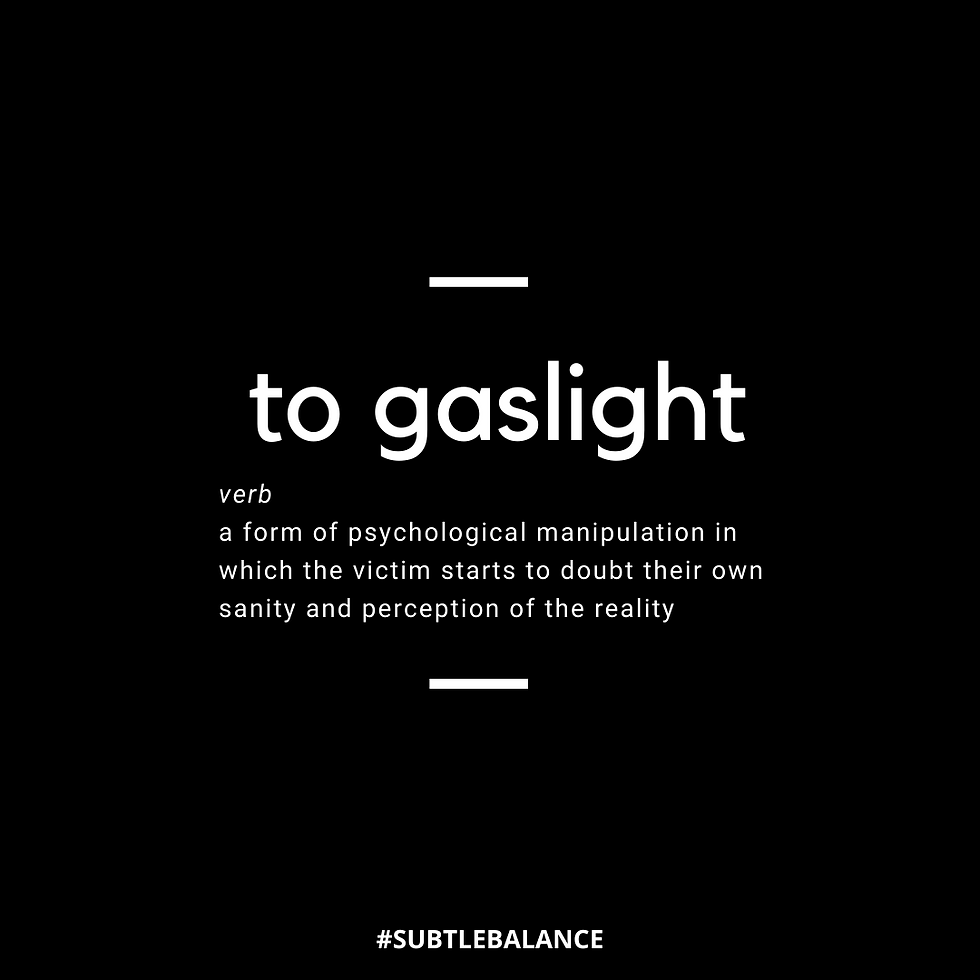Do you know what gaslighting is?
- subtlebalanceantwe
- 2 okt 2020
- 4 minuten om te lezen

We hear the term ‘gasligthing’ more often nowadays, but what is it and where did it come from? The term originated from the 1938 play (and in 1944 the movie) Gaslight, where the protagonist’s husband slowly manipulated his wife into believing she was going mad. There is one specific scene in the movie that gave birth to this term. The husband is using gas lights in an upstairs flat, causing them to dim in his own. His wife brings this up and he convinces her she’s imagining, which is a characteristic of gasligthing. Gasligthing is a form of emotional abuse wherein the person manipulates a person into questioning their own sanity. This form of abuse is most likely to be found in toxic relationships, but can also occur in families and friendships. It may start with seemingly inconsequential things like replacing objects to make the suggestion that you’ve probably misplaced them when you ask for help. Another example might be that they lie about events, saying things like: “that never happened or I never said that”. They will even call the victim crazy, telling them that they’re not sane and should visit a doctor. The goal of the gaslighter is to control the other person by undermining their own judgment and self-esteem, so the victim will be more dependent on the abuser and this for a longer period of time. It may start with harmless events, but when you’ve been a victim of gaslighting for a longer period of time the impact is damaging. Gaslighting will isolate the victim, causing a smaller social network to escape to. The victim will doubt not only their perspective of reality, but also themselves. Eventually they become scared of talking about their feelings and thoughts with someone other than the gaslighter, being convinced that something is terribly wrong with them. This form of emotional abuse can lead to dissociation, depression and other mental health issues. In sever cases it can even lead to suicide. What are five signs of gasligthing:
Using your fears; In an intimate relationship you will share personal matters and even your fears. The gaslighter will use them against you to manipulate you in doing exactly what he or she wants you to do. An example can be that you’re scared of being alone at the house when it’s dark. When you do something harmless that the gaslighter didn’t like he or she will threaten or even punish you by making your fear come true and disappear during the evening. He or she will disappear for a whole night not answering any call or text, leaving you worried and scared.
“knowing” you better; When you express your feelings or thoughts they will correct you and tell you that what you’re seeing, feeling or experiencing isn’t true. Most likely they will use twisted examples from the past to convince you. Saying things like: “do you remember that you said this or that you did that? How can it be different now?” or “you didn’t like that before how come you like it now, didn’t now you’re so changeable”.
Making you doubt yourself; The gaslighter will do everything in his or her power to make you doubt yourself. Going from the small examples in the text above till big events. Things they say are filled with lies, situations twisted and turned, but yet they bring it in such a persuasive way that you start doubting your own way of experiencing things.
Your normal changes; The things that made you you start changing. You lose interest in the things you used to love, especially if the gaslighter isn’t approving them. When friends or family try to make you aware of it, he or she will talk down on them, making you second guess your own friends and family. Things like: “can’t you see that your mother doesn’t like me, she wants us to break up, are you gonna let that happen?” or “he is jealous of what we have, that is why he is starting a fight between us, … are you really gonna choose him above me?”.

For me those are the five most important signs that you are gaslighted. If from these five signs, three or more are used on a frequent basis, you can be sure that you’re in a toxic relationship with someone who wants to make you become dependent. In the next post I will write about how to recognize gasligthing as a victim and how to react. Like I use to say; “it’s not you it might be gasligthing”. With these posts I want to create more awareness about emotional abuse and toxic relationships.
Let’s talk more about those topics so we can help others break free from abusive patterns. It all starts with knowledge right? If you recognize yourself in the examples and if you think that you might be a victim of gaslighting, do contact me. You are not alone!
If you like my work feel free to like, comment and share, but do mention the source.
As always, lots of love,
Selina.
#subtlebalance #lifecoach #lifecoaching #codependencycoach #coachinglife #gaslighting #emotionalabuse #manipulation #toxicrelationships #breakthepattern #codepent #codepentnomore #psychologicalmanipulation #psychologicalabuse #letstalk #notalone #breakthestigma #abuse #abusive #victim #survivor #breakfree




Opmerkingen